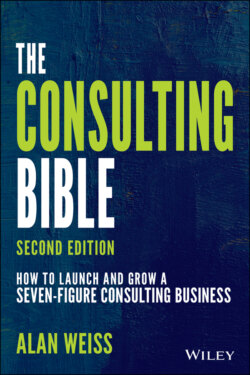Читать книгу The Consulting Bible - Alan Weiss - Страница 39
The True Solo Practitioner
ОглавлениеWhen you are a true solo practitioner (aka independent consultant) according to the criteria we've discussed thus far (brains not hands, improving the client's condition, and so forth), you work on your own, most often from your home or a shared facility where you rent common space. If it's at all possible, work from home, because it's far more comfortable and much less costly. If the distractions are overwhelming, then find inexpensive shared space. Remember, you go to clients; clients don't come to you.6 (The pandemic taught all of us the true needs for working at home.)
Every year, you maximize short‐term and long‐term income. In the short term, you pay for all you can out of pretax income. You then maximize your after‐tax income in varying ways (depending on your legal status as a Subchapter S corporation, or LLC). In the long term, you maximize your contributions to both pretax and after‐tax retirement plans: SEP IRA, traditional IRA, Roth IRA, 401(k), and so forth. You do not reinvest in the corporate entity, other than acquiring the normal equipment and technology you need to stay current and effective. You should operate on a cash basis, recording income as it's received and deducting expenses as they are paid (as opposed to an accrual basis).
The distinctions of the true solo consultant include:
No staff, full‐time or part‐time.
Home‐based office.
Outsourced routine needs, such as printing, graphics, web site design, and so on.
Personal responsibility for key tasks, such as invoicing, correspondence, depositing money, processing credit cards, and so on.
Personal credit funds the company until such time as receivables and critical mass of clients create corporate credit.
No purchases of major assets, such as office space.
Branding may be varied, but ultimate brand is one's name (e.g., “Get me Joyce Wilson”).
No plan to sell the business or leave it to family.
Extensions of income include licensing intellectual property and royalties.
Retirement and benefit programs created solely for the benefit of the consultant and family.
Some people who start out as solo consultants choose to move into the creation of a firm later in their careers. That's fine, as long as key transitions are clear. (And some firm principals choose to dissolve their firms and become solo practitioners—more common than you might think, often caused by financial duress or growing intolerance for managing people.)
